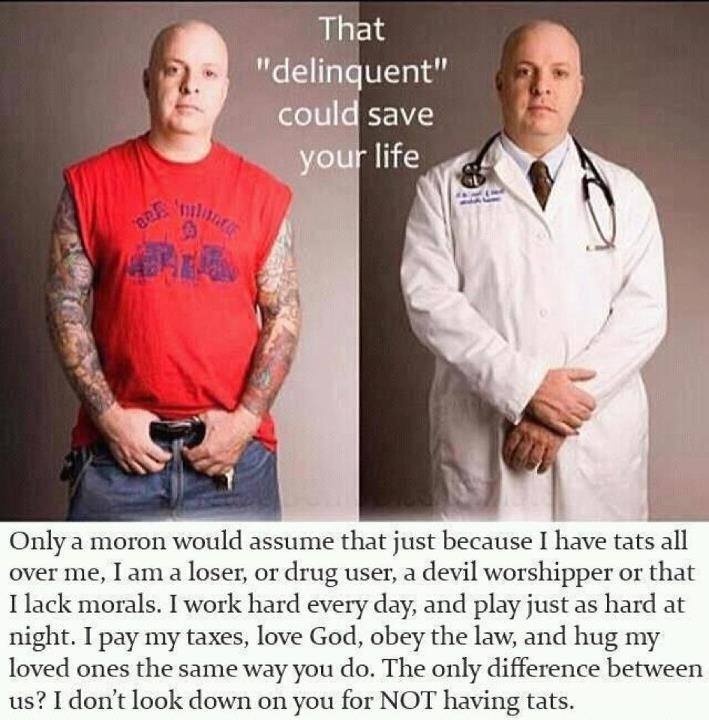
There is a common expression that I'm sure most of us have heard since we were young, "Don't judge a book by its cover". The article I read was about taboo tattoo and how despite the lessons we were all taught since childhood, people are always going to judge you based on how you look. The article was written by an Indian woman and focused on how body art can affect how you are represented to others in the workplace, relationships, and by social stigmas. Many jobs will not hire you if you have body art, body art can be a turn off in relationships, and it has the stereotype that you are a rebel with looser morals. The picture shown above is a perfect example of how such stereotypes are often put into place in our culture.
In Trickster, we see in many stories such as Azban and the crayfish, the dangerous beaver, and Ishjinki and the buzzard that not everything is as it seems. Azban pretended to be dead, the beaver a friendly man, and Ishjinki as various animals. Judging others based on what we see before we know who they really are is such a common downfall not only in literature such as Trickster, but also in everyday life. For modern American Indians we have talked so much in class about their struggle with identity. Back in the day, if someone would see a Native American they were immediately labeled as "savage" or "brute". What have these judgmental stereotypes evolved to now? Not every Native American descendant lives in a tribe or reservation anymore, and those that still do do not live in tepees and long houses anymore. Whether it be tattoos or our race, society always makes judgments based on how we look and will continue to until such stereotypes are overcome.
In Trickster, we see in many stories such as Azban and the crayfish, the dangerous beaver, and Ishjinki and the buzzard that not everything is as it seems. Azban pretended to be dead, the beaver a friendly man, and Ishjinki as various animals. Judging others based on what we see before we know who they really are is such a common downfall not only in literature such as Trickster, but also in everyday life. For modern American Indians we have talked so much in class about their struggle with identity. Back in the day, if someone would see a Native American they were immediately labeled as "savage" or "brute". What have these judgmental stereotypes evolved to now? Not every Native American descendant lives in a tribe or reservation anymore, and those that still do do not live in tepees and long houses anymore. Whether it be tattoos or our race, society always makes judgments based on how we look and will continue to until such stereotypes are overcome.
The point about tattoos in the workplace is eye-opening, I think. I've always thought it was ridiculous and unnecessary that some jobs don't allow you to have visible tattoos, but that's just because I don't see a problem with tattoos in general. I never thought about culturally significant tattoos or body art or piercings that would automatically exclude many people from certain careers. I wonder if most employers even think about culture or race with regard to this rule, and if they do how they justify enforcing it.
ReplyDelete